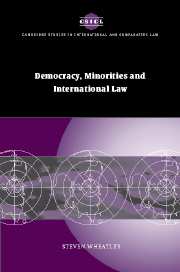Book contents
- Frontmatter
- Contents
- Acknowledgments
- Table of cases
- Table of treaties
- Table of UN resolutions and OSCE and other documents
- List of abbreviations
- Introduction
- 1 The rights of minorities
- 2 The self-determination of peoples
- 3 Democracy
- Conclusion: the accommodation of diversity
- Index
- CAMBRIDGE STUDIES IN INTERNATIONAL AND COMPARATIVE LAW
1 - The rights of minorities
Published online by Cambridge University Press: 27 October 2009
- Frontmatter
- Contents
- Acknowledgments
- Table of cases
- Table of treaties
- Table of UN resolutions and OSCE and other documents
- List of abbreviations
- Introduction
- 1 The rights of minorities
- 2 The self-determination of peoples
- 3 Democracy
- Conclusion: the accommodation of diversity
- Index
- CAMBRIDGE STUDIES IN INTERNATIONAL AND COMPARATIVE LAW
Summary
This chapter examines the protection afforded by international law to ethno-cultural minorities. Central to this discussion is Article 27 of the International Covenant on Civil and Political Rights. The scope of application and content of the minority rights provided by Article 27 are examined, including the requirement for the State to take positive measures to maintain and support minority cultures. The regime concerning national minorities in Europe is considered, to the extent that it illuminates relevant debates at the universal level.
The League of Nations' minorities regime
Throughout the history of international law, examples existed of protective treaties concluded for the benefit of minority groups, often on the basis of some bond of religion, nationality or culture between the protecting power and the protected minority. The most notable example was the inter-governmental system of the League of Nations. In the aftermath of the First World War, the new and greatly enlarged States of Central and Eastern Europe were compelled either to sign minority protection treaties, or to make declarations guaranteeing various rights for their minority groups. The rights of minorities included not only the right to equality under the law, but also certain cultural, educational and language rights. The League of Nations' scheme provided for the protection of certain minorities in certain States, but did not recognise any general rights of minorities. Absent of treaty obligations, no duty to protect the distinctive identities of minority groups existed for States in international law.
- Type
- Chapter
- Information
- Democracy, Minorities and International Law , pp. 7 - 63Publisher: Cambridge University PressPrint publication year: 2005

